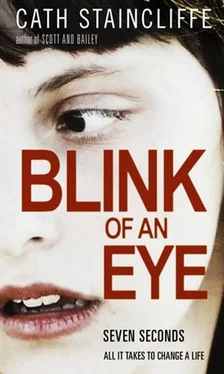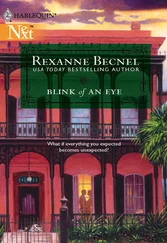I shook my head and exhaled, a long breath. There was nothing I could tell him.
Time passed. My eyes were closed, not because I was trying to sleep but because the harsh lights were unbearable, when a sound startled me, a door banging somewhere in the bowels of the building. My mouth was tacky. I signalled to Phil for the water: he had found a vending machine earlier and got drinks. He handed me the bottle; his eyes were bloodshot, his jaw darkened with stubble.
The next thing I remember, some time later, was the door opening. ‘Mr and Mrs Baxter?’ There were two police officers, a woman with freckled skin and glossy red hair pulled back in a French plait, and a stocky man with his hair cut very short. It made him look like a soldier. I wondered if they still had rules about hairstyles. Was he allowed to have a skinhead? I met plenty of police in the course of my work, but hadn’t come across anyone with such short hair. Maybe he’d had chemo or shaved his head for charity?
He introduced himself and his colleague. I forgot the names as soon as I heard them, but he gave us his card. He was John Leland and he added her name in biro, Phoebe Jones.
‘What happened?’ Phil said straight out, but the man put off answering, saying they would tell us what they could but they needed to ask some questions first.
Outrage flared through me. Were they bargaining with us? Naomi was seriously hurt, her skull cracked, her insides torn, on the operating table; no one would or could tell us if she’d be okay, and now the facts of the accident were being withheld.
‘We want to know what happened.’ My voice was loud and shaky as I got to my feet. ‘Why on earth can’t you tell us that?’
‘Carmel…’ Phil tried to calm me down.
‘The investigation into the accident has only just got under way.’ The woman had a high, breathy voice which sounded at odds with the authority she held.
‘The bare facts, then,’ I insisted. ‘We don’t even know where it was or how they crashed.’
‘Mottram Lane,’ Leland said, ‘just after the junction with Lees Hall Road, near the school.’
Only five minutes from home. I pictured it in my mind’s eye. There were traffic lights on Lees Hall Road and it was a right turn into Mottram Lane coming back from Suzanne’s. The river ran along the left-hand side of the road for a couple of hundred yards until the end of an S-bend where houses began. Opposite, on the right, were houses then a school. The start of the bend was sharp; you couldn’t see round the corner and there had been a successful campaign to get a green-man crossing instead of relying just on a lollipop lady to help people negotiate the traffic.
They were nearly home.
‘What about the other vehicle?’ I said.
Leland stilled and blinked a couple of times; his colleague shook her head almost imperceptibly but I caught it.
‘What?’ I asked. ‘There was another vehicle, wasn’t there?’ I looked at Phil. ‘They said a collision. Monica… or the doctor.’ Suddenly my memory was unreliable. Had someone said that? It was Monica, wasn’t it? Or had I dreamt it up to plug the vacuum of knowledge?
‘A cyclist was involved,’ Leland said. ‘It appears that there was a collision between the car and a cyclist.’
‘Oh God, no.’ I sat down. Cyclists were at real risk of accident. Drivers didn’t see them, didn’t give them enough room; our whole car-first culture and the lack of separate cycleways always made them vulnerable. Phil cycled to work most days unless he had anything bulky to carry. The girls had both used bikes to get around as teenagers, but we wouldn’t let them ride into town, the route was too dangerous.
I imagined a bloke, a mountain biker on his Sunday ride out to the Peaks and back, tired and mud-splattered, lurid Spandex and a fancy water bottle. Or a woman, someone like me, with a butcher’s bike, sit-up-and-beg, a wicker basket in front, cycling home from a picnic with friends. Alex seeing them, a fraction too late.
‘How are they?’ Phil said, his voice gruff.
Phoebe Jones was picking at her nails, her knees and shoes close together.
‘Didn’t survive the accident,’ said Leland.
I gasped, and Phil reached and took my hand, gripped it hard.
‘That’s terrible,’ I said. I saw Naomi holding up the champagne and Alex’s dazzling smile and the patchy shade beneath the birch tree. And some poor person lying like a rag doll on the road, their bike a tangle of metal.
Phil shuddered.
But there was worse to come.
‘It was a little girl,’ Phoebe Jones said, in her breathy voice. ‘Nine years old.’
I struggled to take it in. ‘No.’ Then, ‘You’re sure?’ Desperate. Stupid. As if there was some chance they had it wrong, might backtrack, find a get-out clause. As if they would tell us something like that if there was the faintest margin of doubt.
Leland coughed. ‘I’m sorry.’
‘And you don’t know why, how?’ I asked. ‘Was she crossing the road? Where was it? Was it a blind spot? Could Alex not stop in time?’
Silence. The fizz of the lighting, Phil’s breath unsteady, a swift intake of air from Leland, who shifted on his buttocks and said, ‘Apparently Naomi was driving.’
‘Sorry?’ I was numb, something clotting my senses, my comprehension.
‘Naomi was driving the car; Alex was in the passenger seat.’
Naomi was driving. The enormity of what he was saying tore into me. I could not speak. With my hand clamped to my mouth, I shook my head over and over, my eyes burning. No no no no. Please no. A child was dead. Naomi was driving. Naomi. They were working on her. She was in theatre. Naomi was driving.
After. When everything changed.
Carmel
Sometime the following morning, a nurse came to take us to intensive care. She led us along the warren of corridors, the walls covered with artwork, and introduced us to the surgeon. Mr Hakim was a tall, thin man with piercing eyes and a thick, throaty accent, Greek or Turkish I guessed. He explained that they had repaired damage to Naomi’s small intestine and bowel, and removed her spleen. Broken ribs had perforated her left lung, but they would be carrying out a further procedure to drain and reinflate the lung in due course. After such invasive surgery her recovery would be gradual, and they could not rule out the need for further intervention. We could expect her to be in hospital for several weeks. They were monitoring the skull fracture, but it was a linear one and all being well would not cause any complications.
There were two parallel reactions vying within me: a wash of relief, of gratitude that Naomi was alive, that she’d come through so far; and alongside that a stupefied horror at the litany of injuries she’d sustained.
I glanced at Phil, saw my own apprehension reflected back at me. ‘Can we see her?’ I said.
The doctor nodded. ‘Yes, but don’t expect a response. She’s sedated at the moment, and even when that is withdrawn, she will probably sleep a great deal over the next few days.’
He handed us over to a nurse from the unit. She indicated the hand-gel machines dotted along the ward and told us to use them before and after every contact with the patient. She asked us to put on aprons and gloves from a dispenser outside the room before we went in. All part of the drive to minimize the spread of infection that continued to plague hospitals. And of course, people in intensive care were most at risk.
My first sight of her, head bandaged and hooked up to tubes and wires, brought with it a lurch of pity and grief. I sniffed hard and grasped Phil’s hand. Heard him breathe, bracing himself too. Her eyes were closed, her face and hair visible beneath the dressing. There were brown streaks in her hair, sticking it together in uneven clumps. Dried blood. Her lips were cracked and dry, her eyes stamped with bruises, and through the oxygen mask I could see traces of blood rimming her nostrils. There was a patch of raw skin on her cheekbone. A frown marred her forehead. I wondered if she was in pain.
Читать дальше












